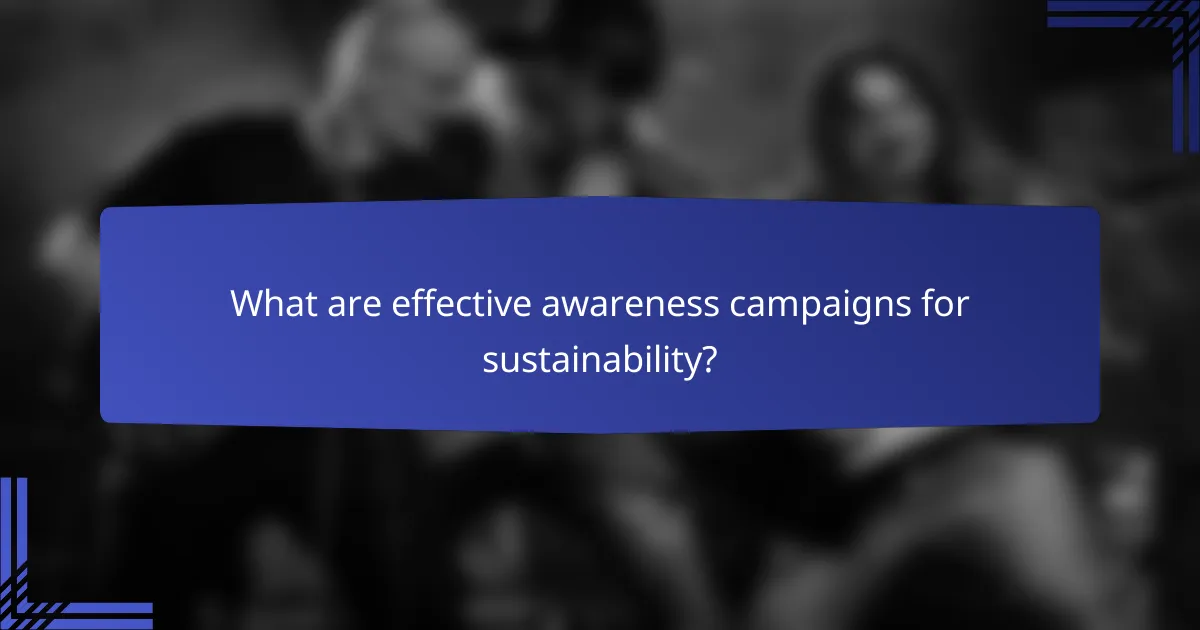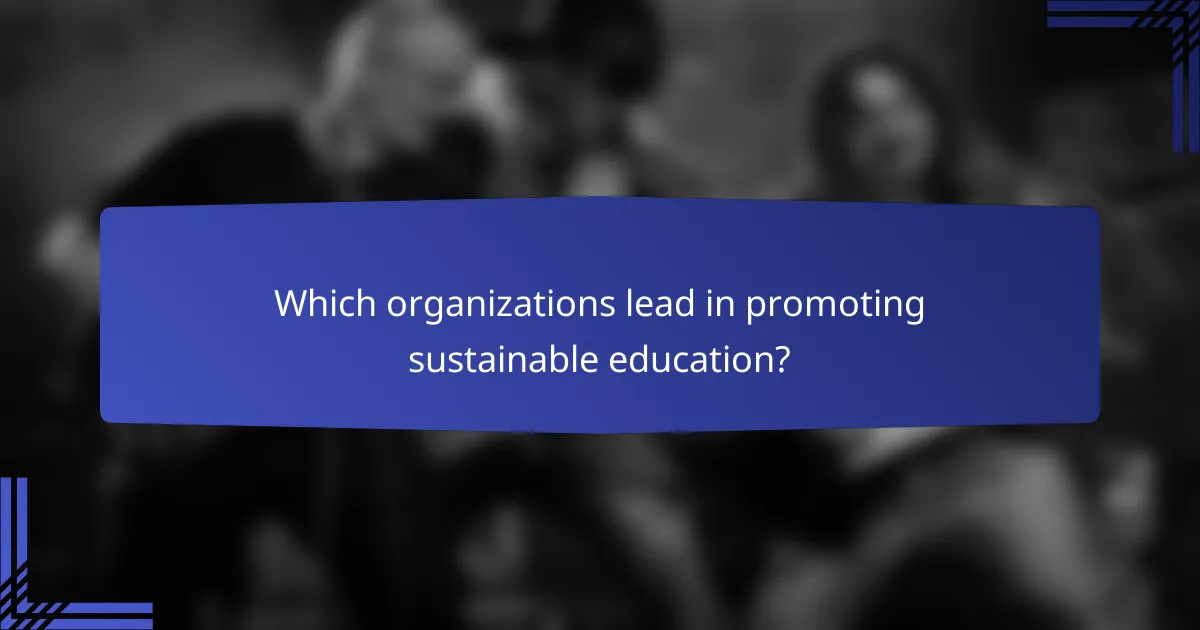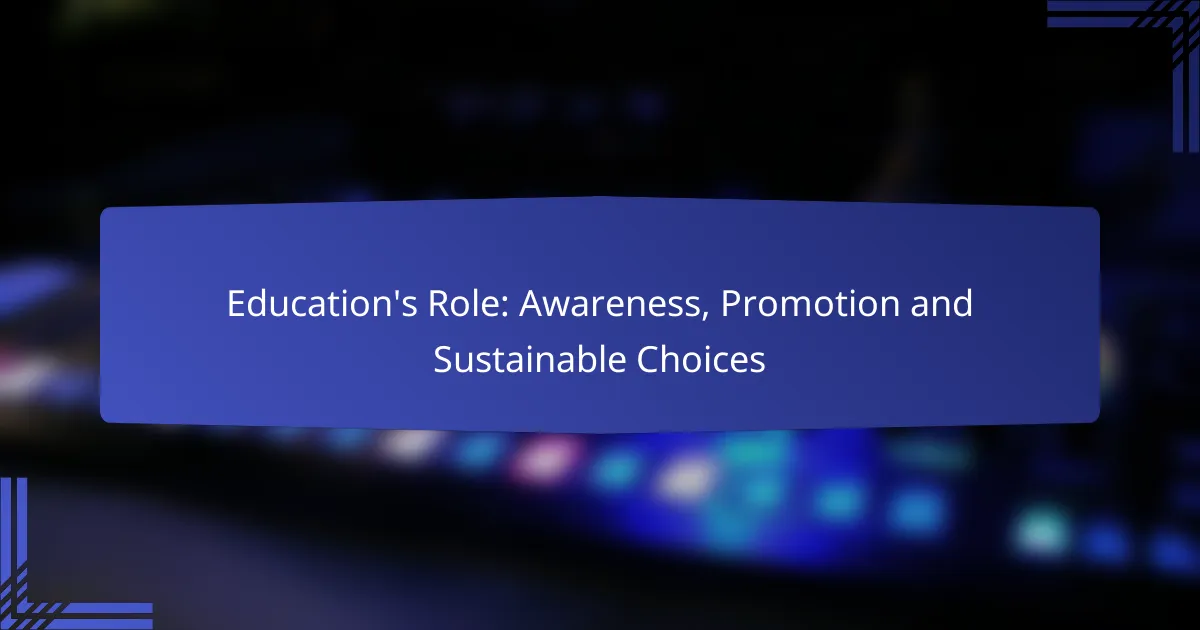Education is essential in fostering sustainable choices by enhancing awareness of environmental issues and equipping individuals with practical knowledge for eco-friendly living. Through targeted initiatives and awareness campaigns, communities can engage with concepts like resource conservation and waste management, ultimately leading to a more sustainable urban environment. By integrating sustainability into educational frameworks, organizations empower individuals to make informed decisions that benefit both their communities and the planet.

How does education promote sustainable choices in urban areas?
Education plays a crucial role in promoting sustainable choices in urban areas by raising awareness about environmental issues and providing practical knowledge for sustainable living. Through various educational initiatives, communities can learn about resource conservation, waste management, and eco-friendly practices that positively impact their urban environment.
Community workshops
Community workshops are interactive sessions that engage residents in discussions and activities centered on sustainability. These workshops often cover topics such as recycling, energy efficiency, and sustainable gardening, allowing participants to learn hands-on skills they can implement in their daily lives.
To maximize impact, workshops should be tailored to local needs and demographics. For instance, urban areas with high apartment living might focus on compact gardening techniques or waste reduction strategies suitable for limited spaces.
School programs
School programs integrate sustainability into the curriculum, teaching students about environmental stewardship from a young age. These programs can include projects like school gardens, recycling initiatives, and field trips to local conservation sites, fostering a sense of responsibility towards the environment.
Effective school programs often involve collaboration with local organizations to provide resources and expertise. Schools can also host competitions or challenges that encourage students to implement sustainable practices at home, reinforcing the lessons learned in class.
Online courses
Online courses offer flexible learning opportunities for individuals interested in sustainability. These courses can range from basic environmental science to advanced topics like urban planning and sustainable development, making them accessible to a wide audience.
Many platforms provide free or low-cost options, allowing urban residents to enhance their knowledge without significant financial investment. When selecting an online course, look for those that offer practical applications and community engagement components to ensure the learning translates into real-world sustainable choices.

What are effective awareness campaigns for sustainability?
Effective awareness campaigns for sustainability focus on educating the public about environmental issues and promoting sustainable practices. These campaigns leverage various channels to engage audiences, raise awareness, and inspire action towards more sustainable choices.
Social media initiatives
Social media initiatives are powerful tools for spreading awareness about sustainability. Platforms like Instagram, Facebook, and Twitter allow organizations to share impactful visuals, infographics, and stories that resonate with users. Engaging content, such as challenges or hashtags, can encourage community participation and amplify the message.
To maximize impact, campaigns should target specific demographics and utilize analytics to track engagement. For instance, a campaign might focus on reducing plastic use among young adults by sharing tips and success stories, thereby fostering a sense of community around sustainable practices.
Public service announcements
Public service announcements (PSAs) are short, informative messages designed to educate the public about sustainability issues. These can be broadcast on television, radio, or online platforms, reaching a broad audience. Effective PSAs often include clear calls to action, encouraging viewers to adopt sustainable behaviors.
For example, a PSA might highlight the importance of recycling and provide simple steps for proper waste sorting. Collaborating with local governments or environmental organizations can enhance credibility and ensure the message aligns with community values and regulations.
Influencer partnerships
Influencer partnerships involve collaborating with individuals who have a significant following to promote sustainability initiatives. Influencers can effectively reach niche audiences and lend authenticity to campaigns. By sharing personal experiences and sustainable choices, they can inspire their followers to adopt similar practices.
Choosing the right influencers is crucial; they should align with the campaign’s values and resonate with the target audience. For instance, a campaign promoting eco-friendly products might partner with lifestyle influencers who prioritize sustainability in their content, thereby enhancing the campaign’s reach and impact.

Which organizations lead in promoting sustainable education?
Several key organizations are at the forefront of promoting sustainable education, focusing on integrating environmental awareness into learning systems. These organizations work to empower individuals and communities to make informed choices that support sustainability.
UNESCO
UNESCO plays a pivotal role in promoting sustainable education through its Global Action Programme on Education for Sustainable Development (ESD). This initiative aims to reorient education policies, programs, and practices to foster sustainability in various contexts.
By providing guidelines and resources, UNESCO encourages member states to incorporate sustainability into their educational frameworks. This includes developing curricula that emphasize critical thinking about environmental issues and sustainable practices.
Green Schools Initiative
The Green Schools Initiative focuses on creating environmentally sustainable schools by promoting eco-friendly practices and curricula. This program encourages schools to adopt green building standards, reduce waste, and enhance energy efficiency.
Schools participating in this initiative often engage students in hands-on projects that teach sustainability concepts, such as recycling programs and community gardens. These practical experiences help students understand the importance of sustainable choices in their daily lives.
Earth Day Network
The Earth Day Network mobilizes individuals and organizations to promote environmental education and action. It emphasizes the importance of sustainability in education through campaigns and resources that inspire students to take action on environmental issues.
By organizing events like Earth Day, the network encourages schools to integrate environmental topics into their lessons and activities. This approach not only raises awareness but also fosters a sense of responsibility among students to contribute to a sustainable future.

What criteria should be considered for sustainable education programs?
Sustainable education programs should focus on integrating environmental awareness, promoting social equity, and ensuring economic viability. Key criteria include curriculum relevance, community involvement, and resource availability, which collectively enhance the effectiveness and impact of these programs.
Curriculum relevance
Curriculum relevance ensures that educational content aligns with current sustainability challenges and practices. Programs should incorporate real-world issues such as climate change, resource management, and social justice, making learning applicable and engaging for students.
For instance, a curriculum might include project-based learning where students develop solutions for local environmental issues, fostering critical thinking and problem-solving skills. This approach not only enhances knowledge but also prepares students for active participation in sustainable practices.
Community involvement
Community involvement is crucial for the success of sustainable education programs. Engaging local stakeholders, such as businesses, non-profits, and government entities, can provide valuable resources and support, enriching the educational experience.
For example, partnerships with local environmental organizations can facilitate field trips, workshops, and volunteer opportunities, allowing students to apply their learning in real-world contexts. This collaboration also helps build a sense of responsibility and connection to the community.
Resource availability
Resource availability refers to the access and quality of materials, facilities, and funding necessary for implementing sustainable education programs. Schools should assess their resources to ensure they can effectively deliver the curriculum and support hands-on learning experiences.
Utilizing local resources, such as community gardens or renewable energy installations, can enhance learning while minimizing costs. Additionally, seeking grants or partnerships can help secure funding for innovative projects that promote sustainability within the educational framework.

How can e-commerce platforms support sustainable education?
E-commerce platforms can play a crucial role in promoting sustainable education by offering eco-friendly products and collaborating with educational institutions. These initiatives not only raise awareness but also empower consumers to make informed choices that benefit the environment.
Eco-friendly product offerings
E-commerce platforms can curate a selection of eco-friendly products that align with sustainable education goals. This includes items made from recycled materials, biodegradable packaging, and products that promote energy efficiency.
For example, platforms can feature brands that adhere to sustainability certifications, such as Fair Trade or Energy Star. Highlighting these products can help consumers easily identify and choose environmentally responsible options.
Partnerships with educational institutions
Forming partnerships with educational institutions allows e-commerce platforms to support sustainability initiatives directly. These collaborations can include sponsorship of educational programs, workshops, or scholarships focused on environmental awareness and sustainable practices.
Additionally, e-commerce platforms can provide resources and tools for schools to integrate sustainability into their curricula, such as online courses or educational materials. This not only enhances learning but also fosters a culture of sustainability among students.
